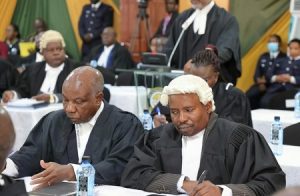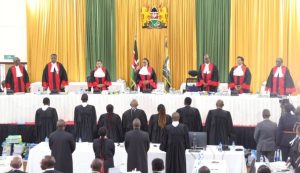Besieged lawyer and Senior Counsel Ahmednasir Abdullahi has turned tides in his war with Kenya’s supreme court, this time, going on the offensive.
Ahmednassir has brought forth damning allegations of corruption within Kenya’s Supreme Court, alleging that judges were bribed during the 2022 presidential petition hearing.
Abdullahi’s claims, detailed in a petition before the East African Court of Justice, shed light on what he describes as a systematic undermining of justice within the apex court.

Lawyer Ahmednasir Abdullahi during Citizen Tv Interview
Abdulahi’s lawsuit against the Kenyan government seeks to overturn a ban imposed on him by the Supreme Court, which he contends is a violation of his right to fair administrative action. The ban, he asserts, was orchestrated through clandestine WhatsApp exchanges among certain members of the Supreme Court bench.
Central to Abdulahi’s petition is the allegation that four out of seven Supreme Court judges accepted bribes ranging from $1.5 to $2 million each to rule in favor of then Deputy President William Ruto in the 2022 presidential petition filed by opposition leader Raila Odinga. Despite these alleged bribes, Abdulahi claims that the judges were ultimately unable to sway the verdict, which unanimously upheld Ruto’s victory.

William Ruto’s lawyers Fred Ngatia and Kithure Kindiki during the hearing of the 2022 presidential petition
The petition not only challenges the legality of Abdulahi’s ban but also seeks damages totaling Sh200 million, representing the legal fees he forfeited due to his exclusion from cases pending before the Supreme Court. Abdulahi argues that the ban was imposed as a means to silence his vocal criticism of corruption within the judiciary, effectively curtailing his freedom of expression.
These revelations have sent shockwaves through Kenya’s legal and political spheres, reigniting concerns about the integrity and independence of the country’s judiciary. With the allegations implicating high-ranking members of the Supreme Court, calls for a thorough investigation into the matter are likely to intensify.

Supreme Court sitting during the 2022 elections
Ahmednasir also detailed how each of the judges of the Supreme Court were bribed. From unnamed powerful politicians, families of leaders, a retired governor, to an intelligence official, Ahmednasir gave clues to the individuals who allegedly offered the bribes to the judges.
“Judge A accepted a bribe that was delivered at Judge A’s home in Nairobi by a very powerful politician; Judge B accepted bribes from 3 individuals, the son of a deceased leader, a retired governor and an influential businesswoman; Judge C took a bribe from a member of the National Intelligence Service (NIS) who subsequently left employment of the said service; Judge D accepted a bribe from a member of Parliament. Initially Judge D wanted the bribe to be given to his wife but later changed his mind.” Ahmednasir claimed in the suit.
As the legal battle unfolds, the credibility of Kenya’s judicial system hangs in the balance, with Abdulahi’s petition serving as a catalyst for broader conversations about accountability, transparency, and the rule of law. The outcome of this case could have far-reaching implications for the future of justice in Kenya and beyond.


